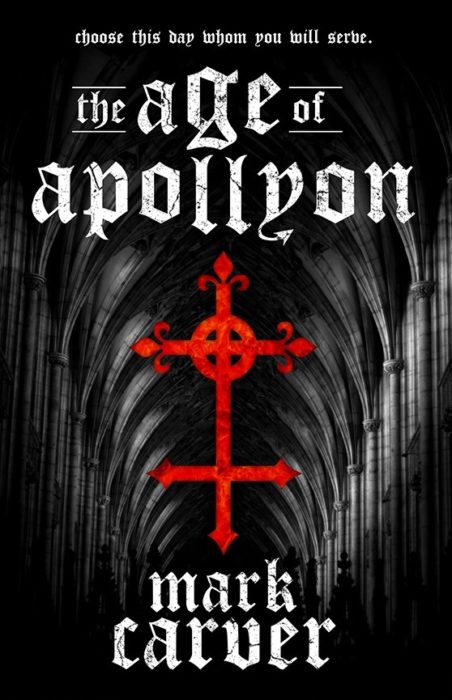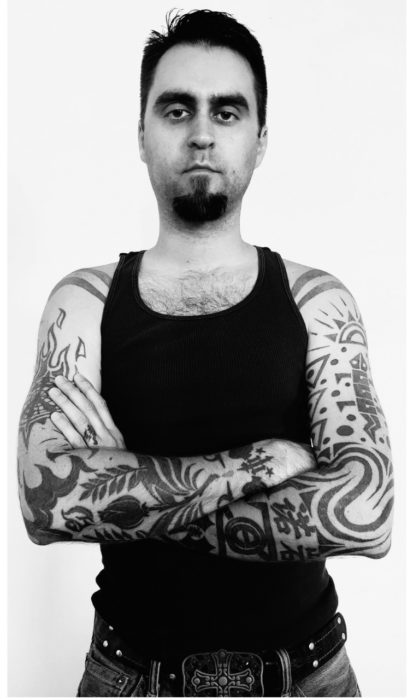From the Archives: How Dark is Too Dark?
My debut novel, The Age of Apollyon, was released in April 2012. Eleven books and one pen name later, it has been re-released by The Crossover Alliance with a bonus short story, and the next two books in the trilogy will soon follow. I’ve come a long way as a person and as a writer since those early days, and when I came across this article from five years ago (my first for Speculative Faith), I thought it would be appropriate to shake off the dust and revisit what was going through my mind back then. Surprisingly, or perhaps not, my perspective is still more-or-less the same today, even though my writing trajectory has changed quite a bit. I hope you enjoy this blast from the past, and if you’re looking for an ultra-Gothic supernatural thriller, The Age of Apollyon has more creepy goodness than you can shake a crucifix at!
HOW DARK IS TOO DARK?
originally published on August 15, 2014
 I am the author of The Age of Apollyon Trilogy, a series that imagines a world where the devil has physically revealed himself while God remains silent. Satanism becomes the dominant world religion and the protagonist of the story is a practicing Satanist.
I am the author of The Age of Apollyon Trilogy, a series that imagines a world where the devil has physically revealed himself while God remains silent. Satanism becomes the dominant world religion and the protagonist of the story is a practicing Satanist.
You’re probably never going to find these books on the shelves of a Family Christian Bookstore.
Yet I unashamedly label these books as “Christian fiction” and they are put out by a Christian publisher that releases Amish romances and uplifting devotionals. This was quite a risk on their part but I appreciate their bravery in keeping me on the roster. Of course, the Christian elements of the trilogy are not hard to spot but it is much darker and edgier than what is usually labeled as “Christian fiction.”
When I was writing these books, I was constantly asking myself the question in the title of this article: how dark is too dark? I was writing books about Satan, a Satanic world, Satanic people … but was I going overboard? Was I stepping over the line of necessity into gratuitousness? I wanted the books to be startling and even shocking at times, but the writing process felt like trying to rein in a runaway horse.
It was very hard doing the research for these books. I had to investigate rituals, incantations, terminology, and put myself in the frame of mind that my protagonist existed in — namely, despising God and embracing the darkness. It was mentally and spiritually exhausting and I could feel the darkness pressing on my mind all the time, affecting my mood, pulling me away from the light.
I was very glad when these books were finished.
I set out to write these books with the primary purpose to entertain, but I also wanted to convey a message. So I had to ask myself: what message? God is good, Satan is bad? Real men don’t worship the devil?
As the story took shape, I realized that it wasn’t about the battle between Heaven and Hell; it was about the battle within the human heart, between the root of evil that already exists there against the redemption that is so simple and yet so hard to accept. I wanted to plumb the depths of depravity in order to show how necessary that lifeline is to us fallen creatures.
So plumb I did. In fact, I feel like I kept things pretty tame. It could have been so easy to let the dog off the leash and revel in shock and horror but that would have overridden my purpose. I’ve come across several books in the Christian underground that examine the depraved human soul in order to elucidate the need for a Savior, but sometimes they come across as thinly-disguised horror schlock. I wanted to pattern my books after the Gothic classics that inspired me: The Hunchback of Notre Dame, The Monk, and Dracula. Bram Stoker’s masterpiece was particularly instrumental, because the terrifying darkness that permeated the story was offset by the heroes’ unwavering grasp on the light of Heaven to help them defeat evil. That was the kind of energy that I wanted to flow through my story, though I took sort of a reverse approach to reach the same destination.
But how dark is too dark? Is it permissible to include horrific and explicit elements in a story intended for the Christian market? My answer would be: it depends.
It really comes down to the author’s motivation for including these elements. Are they just trying to stand out and attract secular readers? Are they trying to make Christian fiction more mainstream? Are they a bit twisted in the head and need an outlet for their dark fantasies?
Or are they trying to turn the dark eyes of the world towards the light of redemption? A tiny candle flame burns brilliantly in a dark cave; without total darkness, it is hard to appreciate the relief and comfort that light brings. I believe this is why God allows such evil to exist in the world — to bring to our attention our desperate need for salvation and deliverance from the evil that we perpetuate all by ourselves.
And who says it can’t be the same in the world of fiction? If the darkness is shown to be just that, and not as something intriguing, appealing, or liberating, then there are no limits. But those of us who unleash the darkness have a responsibility to point the way to the light.
There’s enough horror in the world as it is.






































Thank you for this article, Mark. My friend and I were just discussing our own WIPS and wondering if we were making them too dark ourselves.
It’s good to hear your opinion on this and your cautions. I really appreciate it.
The Devil’s main interest is destruction. He comes for no other reason but to kill, and to steal, and to destroy. Satan could not enjoy being worshipped. He cannot enjoy anything (C. S. Lewis’s introduction to the Screwtape Letters is a great discourse on this matter). Really, if Satan ever did deal with a race of beings, his only goal would be to destroy them. We turn Satan into a “bad version of God,” and assume he would want the things God wants (worship, adoration, obedience); but he would not want those things. Those things are not what he shows up for. That’s why I am a little reticent to give the Devil more than his due, which is what Jesus stated in the verse quoted reference above. The old Rolling Stones Song “Sympathy for the Devil” begins, “Permit me to introduce myself. / I’m a man of wealth and taste.” But Satan could not be a man of wealth and taste because he is incapable of enjoying the things that wealth and taste enable (fine food, art, music, beauty). He has three purposes, and that’s all.
Even if that’s true, he could desire and pursue those things as a means to an end. Being ‘a man of wealth and taste’ would be a way to tempt some people into listening to him. People can be destroyed by wealth, poverty, and every level in between.
It’s actually a pretty interesting topic, how the perception of Satan has changed, especially when they slapped on things that related more to Hades than OG Satan (wealth, sophistication a la Mephistopheles).
Ah, a fellow Lindsay fan. XD And I completely agree.
I’ve been meaning to suggest ContraPoints to you, but there hasn’t really been a post-relevant way to do it so I’ll just plunk out the one that was my introduction to her:
That is exactly the point that I make in these books. It’s possible to get the wrong idea from the synopsis and marketing materials, but there is no “Kingdom of Satan” in a literal sense, with Lucifer sitting on an infernal throne with the Whore of Babylon by his side. Satan only shows up in these books for a few sentences. The kingdom that follows is wholly man-driven and man-centric, which is what Satan wants. He doesn’t want a kingdom for himself; he just wants people to worship anything but the true God.
I’d like to see how you can clearly elucidate Satan’s only purposes and desires from the Scripture text alone.
Let’s think about it: Satan is very smart. He also knows that the Bible is the word of God and everything in it has or will come to pass. It is clear from Scriptures that God will return and set up His eternal kingdom on earth, so Satan would have no illusions of overthrowing God and changing the course of prophesied history. So what is left to do? Pour out his wrath on God’s people and try to deceive as many unbelievers as he can. There is only one true God; there are a million false gods. Satan’s plan of trying to divert man’s attention from God onto anything else is very apparent in Scripture.
There’s a lot of wiggle room in that, though. Is Satan dark, angry, and carefully strategic, or is he clever but also sadistic and playful? Those are just two personality variations that can make a world of difference in purpose and behavior.
I just finished the Jane Hawk series by Dean Koontz. I read them for the story and skimmed a lot of the chapters, especially scenes with the villains, because for my taste Mr. Koontz goes overboard in portraying evil. Some ideas are hard to get out of one’s head, so I try not to let them in.
I think, as you say, Mark, that there’s a place to show what evil is capable of, but also that an author has a responsibility not to revel in shock and horror. If I want to see evil, I only have to read the national news. But also the reader has to be responsible for himself, and not take on more than he can handle.
Who knows, your books may show the light to some readers who would never read Christian fiction, but love dark stuff.